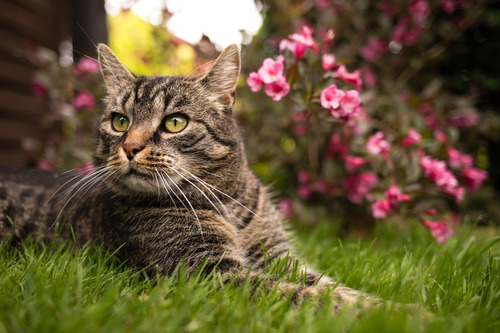As a dedicated cat owner, your home is not just a place to live; it’s a shared space between you and your beloved pet. While creating this shared space, it’s important to be mindful of the plants you choose to decorate your home and garden. Some plants, while beautiful, can pose significant risks to your cat’s health. Northwoods Veterinary Clinic in North Charleston, SC, is here to guide you through identifying eight common plants that are poisonous to cats.

Listed below are the more common and dangerous household plants. If you suspect your cat has ingested any part of any of these plants or if you are noticing any of the signs/symptoms associated with their ingestion, it is imperative to call Northwoods Veterinary Clinic at 843-553-0441 or seek emergency care right away.
Lilies (Lilium spp. and Hemerocallis spp.)
Lilies are among the most dangerous plants for cats, with even a small amount of pollen or a single petal causing severe kidney problems. Not all lilies are toxic, but it’s best to avoid them altogether to keep your cat safe. Symptoms of lily poisoning include vomiting, lethargy, and a lack of appetite. If you notice these signs and know your cat has been near lilies, seek veterinary care immediately.
Sago Palm (Cycas revoluta)
The Sago Palm, often used in landscaping and as indoor decorations, contains cycasin, a substance that can cause liver failure and potentially death in cats. Every part of the plant is toxic, making it a significant risk in homes. Watch for vomiting, diarrhea, weakness, and seizures. If your cat displays any of these symptoms and might have chewed on a Sago Palm, contact Northwoods Veterinary Clinic right away.
Tulips (Tulipa spp.)
The bulb of the tulip contains the highest concentration of toxins, but the entire plant can be harmful to cats. Tulipalin A and B are the compounds responsible for the toxicity. If your cat has ingested part of a tulip, symptoms can include intense vomiting, depression, and even heart issues. Early intervention is crucial for their health.
Azaleas (Rhododendron spp.)
Azaleas, part of the Rhododendron family, can cause vomiting, diarrhea, drooling, and lethargy in cats. In severe cases, azalea ingestion can lead to coma or death. Any consumption of azalea by your cat warrants an urgent call to your vet. Prompt treatment can make a significant difference in the outcome.
Oleander (Nerium oleander)
Oleander is a popular ornamental shrub that contains cardiac glycosides, toxic to cats and can affect the heart. Every part of the oleander plant is poisonous. Symptoms include drooling, abdominal pain, diarrhea, and possible heart failure. Due to the severity of the toxins involved, contact your veterinarian at Northwoods Veterinary Clinic as soon as possible.
Dieffenbachia (Dumb Cane)
Dieffenbachia, or Dumb Cane, can cause oral irritation, intense burning and swelling of the mouth, tongue, and lips, difficulty swallowing, and vomiting if chewed by a cat. If you see your cat drooling excessively or showing signs of oral discomfort after being near a Dieffenbachia plant, it’s time to seek veterinary help immediately.
Autumn Crocus (Colchicum autumnale)
The Autumn Crocus contains colchicine, a toxic alkaloid. This plant is especially dangerous because symptoms may not appear until days after ingestion. Symptoms can include severe vomiting, gastrointestinal bleeding, liver and kidney damage, and respiratory failure. Early detection and treatment are vital, so if you suspect your cat has ingested this plant, call us at (843) 553-0441 immediately.
Castor Bean (Ricinus communis)
Though the castor bean plant is known for its attractive foliage and the production of castor oil, its seeds contain ricin, a highly toxic substance to cats. Signs include loss of appetite, abdominal pain, drooling, diarrhea, excessive thirst, weakness, and convulsions. Ricin poisoning is an emergency that requires immediate veterinary attention.
Keeping Your Cat Safe and Healthy
Our homes and gardens should be safe havens for our cats, free from hidden dangers. By being aware of and removing poisonous plants, you’re taking a vital step in protecting your feline friend. If you have any concerns about plant toxicity or if your cat shows signs of poisoning, please call Northwoods Veterinary Clinic at (843) 553-0441.
